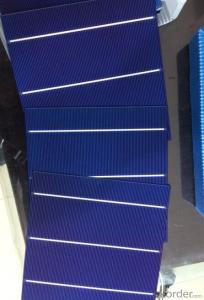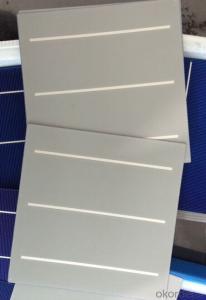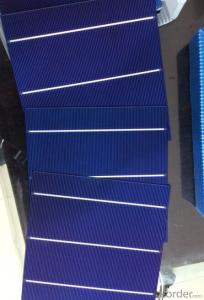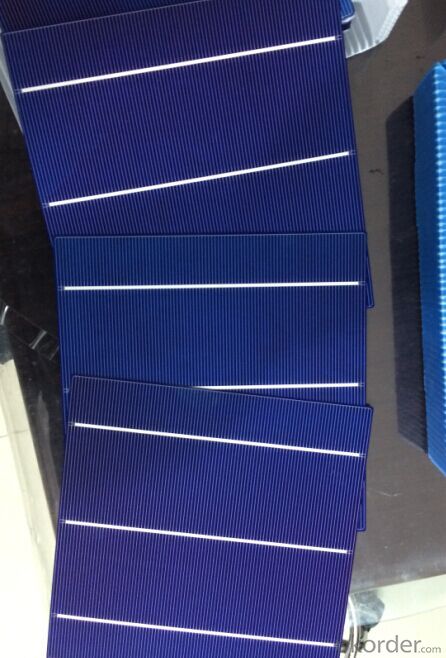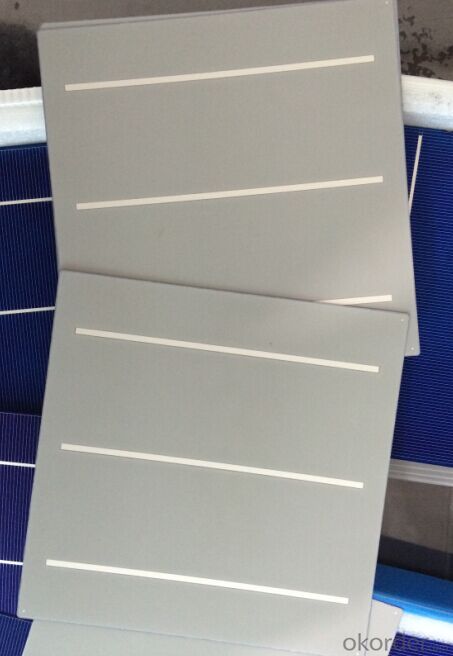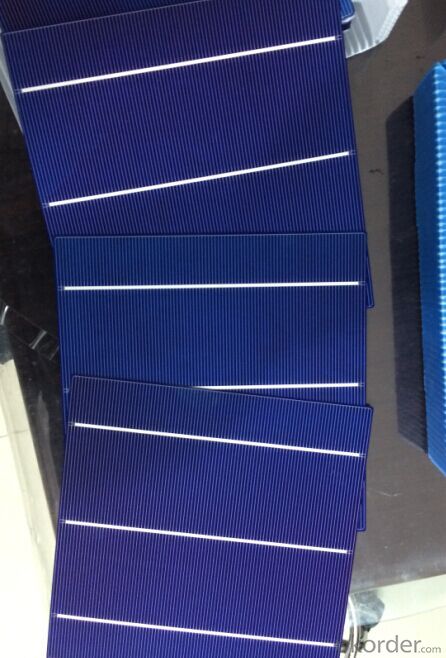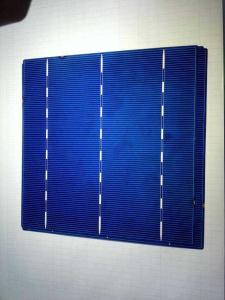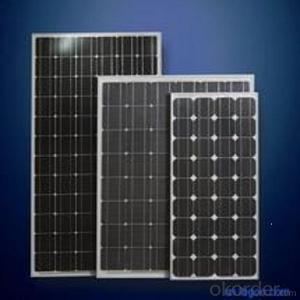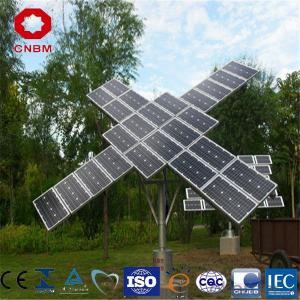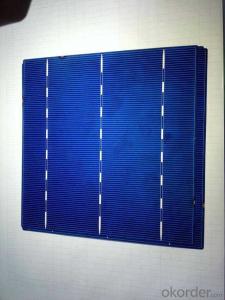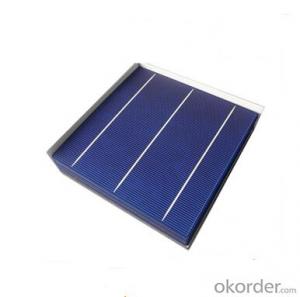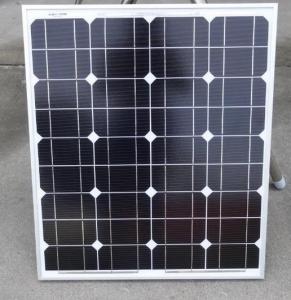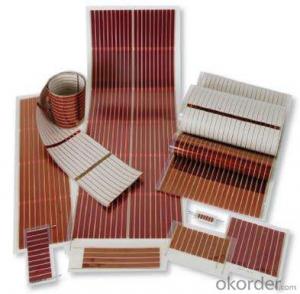Residential Solar Cells - Poly Solar Cells Lower Than 4Watt Eff Better Price
- Loading Port:
- Shanghai
- Payment Terms:
- TT or LC
- Min Order Qty:
- 30000 pc
- Supply Capability:
- 1000000 pc/month
OKorder Service Pledge
OKorder Financial Service
You Might Also Like
Electrical Characteristic
Efficiency (%) | Pmpp (W) | Umpp (V) | Impp (A) | Uoc (V) | Isc (A) | FF (%) |
17.25 | 4.197 | 0.524 | 7.992 | 0.62 | 8.458 | 80.03% |
17 | 4.137 | 0.524 | 7.876 | 0.619 | 8.353 | 80.01% |
16.75 | 4.076 | 0.522 | 7.81 | 0.617 | 8.286 | 79.73% |
16.5 | 4.015 | 0.518 | 7.746 | 0.613 | 8.215 | 79.73 |
16.25 | 3.955 | 0.515 | 7.683 | 0.61 | 8.144 | 79.61% |
16 | 3.894 | 0.512 | 7.613 | 0.608 | 8.075 | 79.31% |
15.75 | 3.833 | 0.51 | 7.534 | 0.605 | 8.058 | 78.62% |
15.5 | 3.772 | 0.508 | 7.453 | 0.604 | 8.02 | 77.87% |
15.25 | 3.771 | 0.505 | 7.35 | 0.604 | 9.997 | 76.83% |
15 | 3.65 | 0.503 | 7.271 | 0.604 | 7.989 | 75.64% |
14.5 | 3.529 | 0.499 | 7.067 | 0.604 | 7.988 | 73.14% |
14 | 3.407 | 0.499 | 6.833 | 0.604 | 7.833 | 72.01% |
Advantage Of Poly Solar Cell 156mm
1: High quality cell, Level A cell (14%—17.5%)
2.Dimensione:156*156mm Diagonal:200mm
3: Qualified certification: TUV,CE certification.
4: Warranty: five years for whole unit
Usage/Application Of Poly Solar Cell 156mm
Packaging & Delivery Of Poly Solar Cell 156mm | |
Packaging Detai | Packaging Detail:Export Carton and Pallet or under customer request. |
Delivery Detail:10-20days | |
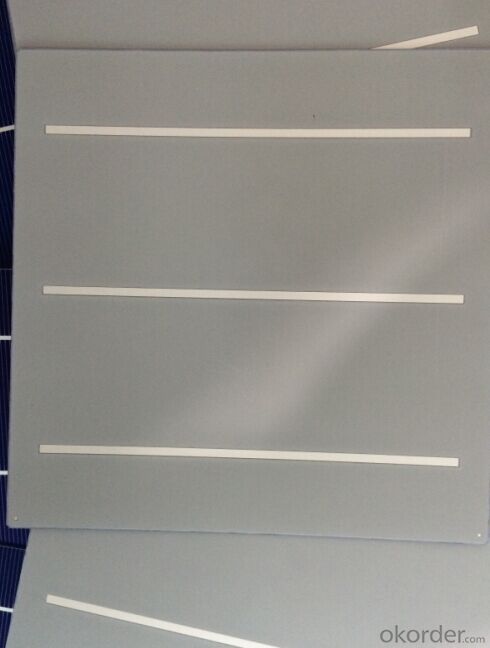
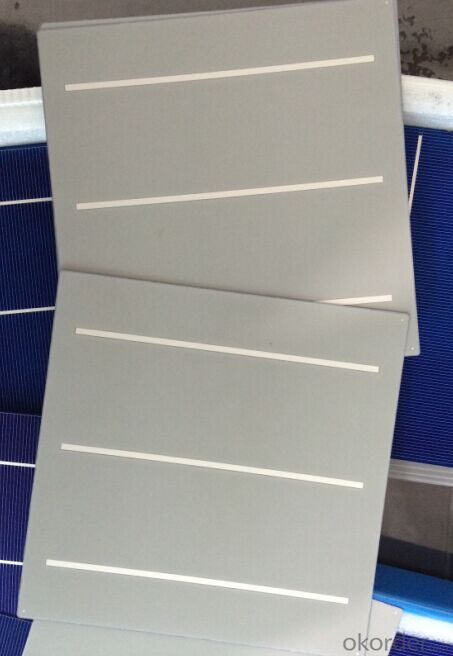
Solar cells are typically named after the semiconducting material they are made of. These materials must have certain characteristics in order to absorb sunlight. Some cells are designed to handle sunlight that reaches the Earth's surface, while others are optimized for use in space. Solar cells can be made of only one single layer of light-absorbing material (single-junction) or use multiple physical configurations (multi-junctions) to take advantage of various absorption and charge separation mechanisms.
- Q: What is the impact of hurricane-force winds on solar cell efficiency?
- The impact of hurricane-force winds on solar cell efficiency can be significant. Strong winds can cause physical damage to the solar panels, such as cracks or detachment, which can reduce their ability to generate electricity. Additionally, debris carried by the winds may also damage the panels, further decreasing their efficiency. Therefore, it is crucial to ensure proper installation and structural resilience to mitigate the negative effects of hurricane-force winds on solar cell efficiency.
- Q: Can solar cells be used in traffic management systems?
- Yes, solar cells can be used in traffic management systems. Solar cells are a renewable and sustainable source of energy that can provide power for traffic lights, road signs, surveillance cameras, and other equipment used in traffic management systems. By relying on solar energy, these systems can reduce their carbon footprint and decrease dependency on grid electricity.
- Q: What is the role of tracking systems in maximizing solar cell efficiency?
- Tracking systems play a crucial role in maximizing solar cell efficiency by continuously adjusting the position of solar panels to optimize their exposure to sunlight. These systems enable solar panels to track and follow the sun's path throughout the day, ensuring that they are always facing directly towards the sun. By doing so, tracking systems can enhance the amount of sunlight captured by solar cells, resulting in increased energy production and overall efficiency.
- Q: Can solar cells be used to power emergency lighting systems?
- Yes, solar cells can be used to power emergency lighting systems. Solar cells convert sunlight into electricity, which can be stored in batteries for later use. This makes them a reliable and sustainable source of power for emergency lighting, ensuring that they will continue to function even during power outages or other emergencies.
- Q: Can solar cells be used for disaster relief efforts?
- Yes, solar cells can be effectively used for disaster relief efforts. Solar cells provide a reliable and sustainable source of energy, which is crucial during emergencies when conventional power sources may be disrupted or unavailable. Solar cells can power essential devices such as lighting, communication equipment, and medical devices in disaster-stricken areas, improving response and recovery operations. Moreover, solar-powered systems can be quickly deployed and are cost-effective in the long run, making them an ideal solution for disaster relief efforts.
- Q: How does the solar cell work in terms of photochemical conversion?
- The photovoltaic cell module is capable of generating electromotive force when light is irradiated to obtain energy.
- Q: Can solar cells be used for water heating applications?
- Yes, solar cells can be used for water heating applications. Photovoltaic (PV) solar cells can convert sunlight directly into electricity, which can then be used to power electric water heaters. Additionally, solar thermal collectors can be used to heat water directly by absorbing sunlight and transferring the heat to the water. Both methods offer efficient and sustainable alternatives to traditional water heating systems.
- Q: How do solar cells perform in areas with frequent hurricanes?
- Solar cells can still perform efficiently in areas with frequent hurricanes, provided they are properly installed and designed to withstand severe weather conditions. It is crucial to use durable materials and secure mounting systems to ensure the panels are not damaged or dislodged during high winds. Additionally, incorporating measures like reinforced frames and hurricane-resistant glass can further enhance their resilience. However, it is important to note that extreme weather events may temporarily disrupt solar power generation due to damaged infrastructure or reduced sunlight availability.
- Q: Can solar cells be used for portable devices?
- Yes, solar cells can be used for portable devices. Advances in technology have made it possible to miniaturize solar cells, making them suitable for powering various portable devices such as smartphones, tablets, and even wearable electronics. These devices can be charged directly from sunlight or through the use of portable solar panels, offering a sustainable and renewable source of power on the go.
- Q: How are solar cells tested for quality?
- Solar cells are tested for quality through a series of rigorous evaluations and inspections. These tests typically involve measuring the electrical performance, efficiency, and durability of the cells. They are subjected to various environmental conditions, such as extreme temperatures and humidity, to ensure they can withstand different climates. Additionally, visual inspections are conducted to check for any manufacturing defects or physical damages. Overall, these quality tests help determine if the solar cells meet the required standards for optimal performance and reliability.
Send your message to us
Residential Solar Cells - Poly Solar Cells Lower Than 4Watt Eff Better Price
- Loading Port:
- Shanghai
- Payment Terms:
- TT or LC
- Min Order Qty:
- 30000 pc
- Supply Capability:
- 1000000 pc/month
OKorder Service Pledge
OKorder Financial Service
Similar products
Hot products
Hot Searches
Related keywords
